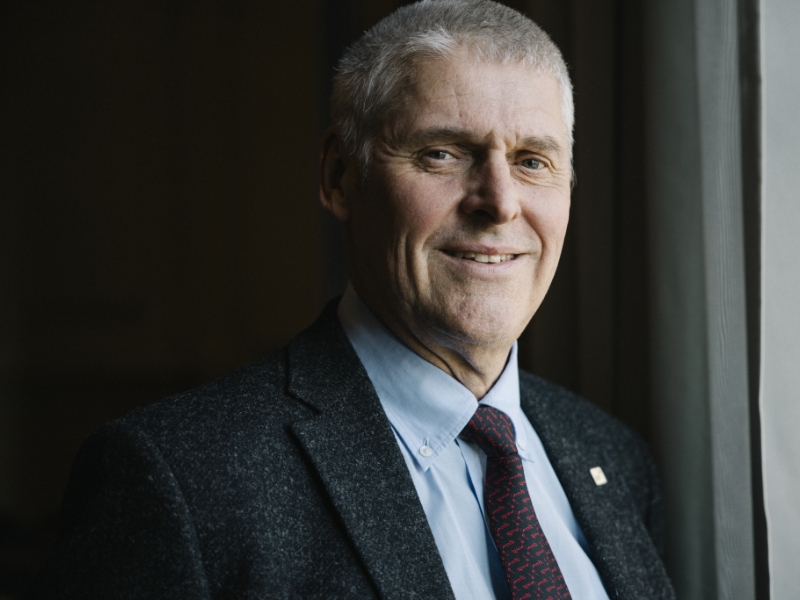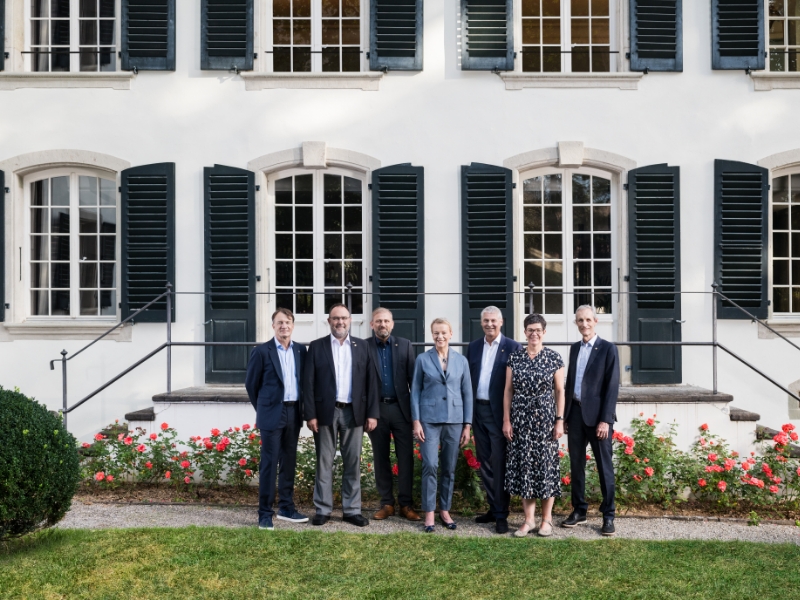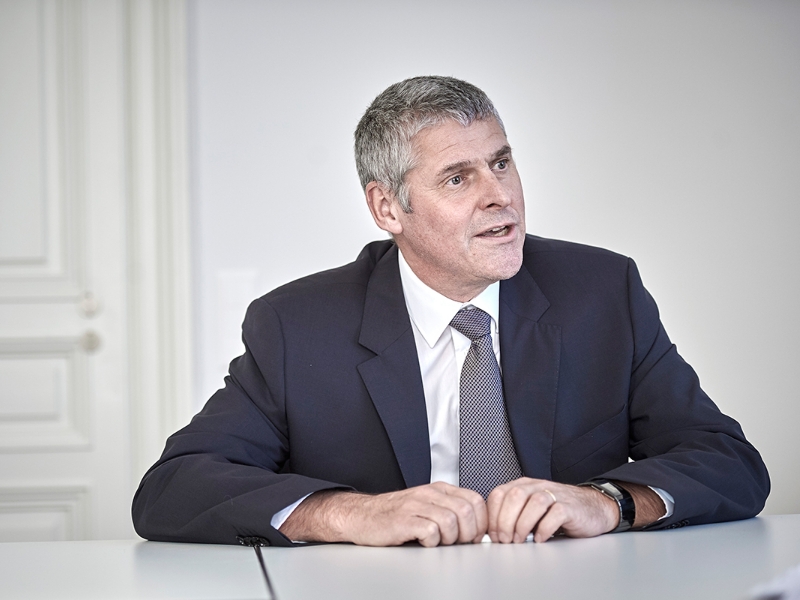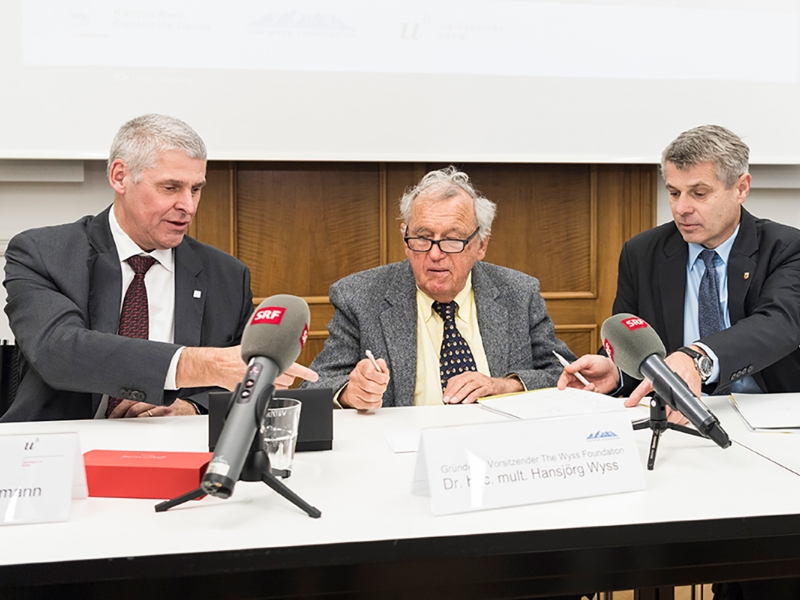Farewell interview
“You don’t implement any projects on your own as Rector”
Rector Christian Leumann is leaving the University of Bern at the end of the week to become Head of the Interim Management Board of the Insel Group. He has prudently led the University of Bern over the past eight years, been responsible for various developments such as “Medizin 100 plus” and strengthened international collaboration.

Christian Leumann:No, of course I never imagined it that way, and until recently it was off the cards that I should take on a nearly full-time job again after my position as Rector and my retirement. My employment at the Insel Group came about due to an emergency situation. An interim solution was needed in the short term to ensure the continuation of operations, particularly in the medical area, and to allow things to settle down.
And what does that mean for your personal life?It wasn’t an easy decision. I didn’t take it alone either. On the contrary, we discussed this at great length at home and now we will have to see which of our plans we can save. It looks promising for our planned three-week holiday in September. However, you never know if you’ll really manage to stay away from it all. What will fall by the wayside, of course, is spontaneity. Originally, we primarily wanted to use the free agenda to do something unplanned. It goes without saying that that’s now no longer an option, and the agenda is jam-packed.
The University is now experiencing a rather quick handover of the reins. Isn’t that a problem?That shouldn’t be a problem, as my succession and that of the vacant position of Vice-Rector have already been arranged. And after all, it’s only a matter of six weeks. It mostly requires a great deal of flexibility from my successor Virginia Richter. She now has to reorganize her plans for an orderly handover of the Vice-Rectorate and the academic projects. I am extremely grateful to her and to the entire Executive Board of the University of Bern for all their understanding and outstanding support for one another.

These are long-term projects and it was always clear that they would outlast my term as Rector. There is therefore no risk that they will not be pursued now, just because I am resigning six weeks earlier. These projects are supported by the entire University Executive Board and many other committed individuals, and I am convinced that these people will continue to pursue them as planned.
“In all knowledge and teaching cultures, we have to ask ourselves what scholarliness actually is, what the role of a university is, and what the role of a university is not.”
Christian Leumann
In recent weeks and months, you have have had to deal intensively with the issue of scholarliness and activism. Is this a new development?That is difficult to say. It is probably more of an issue that has already evolved over decades, but it has never before come to the surface in such a concise manner as it has now, after the Hamas attack on Israel and the subsequent and ongoing war. This has led to upheavals in the university landscape around the world, and it should make us think. In all knowledge and teaching cultures, we have to ask ourselves what scholarliness actually is, what the role of a university is and what the role of a university is not. We need to have this dialog within the university, and I am convinced that it will also take place. It’s in the best of hands with my successor.
You took over the Rector’s Office eight years ago. How do you remember the moment you were elected?I remember saying during the Senate interview that University of Bern was selling itself and its services far below value. And I was of the opinion that we should be much more confident. Interestingly, it was much more difficult for me to become Vice-Rector in 2011. All the Vice-Rectors were reappointed and there was competition. Bruno Moretti and I were waiting in front of the Senate room for our interviews. He went in and came back out after five minutes and everything was decided. And in my case, the Senate negotiated for about 20 minutes, and I thought it might also go wrong.

Until 2019, we were able to focus very strongly on the development and positioning of the University and work more or less in peace. Then came COVID-19. It was the first time in my term that we had to convene the crisis management team. The team met every week for almost one-and-a-half years, and we were very caught up in crisis management and hardly had time to develop the University further. However, we have probably seen the biggest change in the past six months. Since October 7, we have been confronted with a situation that is extremely challenging for all of us. And I suspect that this experience of crisis management was also part of the reason why they brought me to the Insel Group.
Have these crises also changed the position of the Rector?In crises, a somewhat stronger, clearer and more centralist leadership is certainly needed, because decisions have to be made quickly in such situations, and because not every faculty can and should develop its own measures and standards. Conversely, the need for leadership within a university is greater, and as Rector, you have a corresponding responsibility. However, this does not have a long-lasting effect in an expert organization like a university. Internally, leadership skills quickly become relativized when a crisis subsides, because the faculties then resume their position and conduct their own analysis of crisis management, which is the right thing to do. But to the outside world, the image of the Rector as the figurehead of the university remains stronger than was previously the case.
Are there any decisions that you would make differently in retrospect?It’s not like I make decisions on my own as Rector, but all decisions were made by the University Executive Board. I think there were only two votes in my entire career on the University Executive Board, and all other decisions have been reached by consensus. The preliminary discussions and debates in this committee lead to a critical consideration of ideas and thus to a selection process. In hindsight, I can therefore say that I can’t think of anything I would regret or where we really messed up.
To what extent were you able to promote and develop research and teaching at the University?The promotion of early career researchers has always been important to me, and here we were certainly able to take a step towards more attractive and better career planning for younger early career researchers. A second important point for me was that we at the University were able to develop an understanding that encompasses the academic value chain from basic research and innovation to the development of economically and socially relevant products and services. In the past, we were very focused on basic research, and today we are translating our scientific findings more into added value for society. After all, that’s one of the tasks a university has.
“The promotion of early career researchers has always been important to me, and here we were certainly able to take a step towards more attractive and better career planning for younger early career researchers.”
Christian Leumann
In teaching, we have developed measures to deal with digitalization and its rapid developments, such as artificial intelligence. It has always been important to me that we focus on people and not be driven by technology. We want our students to develop the relevant fundamentals that qualify them for their future leadership roles in business and society, regardless of their chosen field of study. How has the University changed overall during your term?What I have noticed is that, on the one hand, IT systems have changed massively and, on the other hand, leadership at all levels has become more difficult. We used to have IT systems as tools, but today we build the processes around the systems. As a researcher, leadership was more of a side effect that you learned “on the job”. Today, this is no longer so easy due to the legal requirements, such as those relating to human resources or finance, as well as the requirements for professional support of employees, such as employee appraisals and the consideration of their needs, such as working from home. After all, these are not just administrative processes, but management tasks that you now have to take on in a management position at a university.
Which moments of your term are particularly memorable to you?I remember many projects that we were able to initiate and implement. I will mention, for example, “Medizin 100 Plus,” the development of pharmacy training into a full degree programme or the establishment of the School of Engineering together with the Bern University of Applied Sciences. We have also set up strategic research centers, developed the Strategy 2030 and the Digitalization Strategy, and had the opportunity to build up the Wyss Academy. I have always found these policy-shaping moments very positive.

I learned a lot during this time – especially also during the crisis situations. I was able to spend a lot of time at the University, which gave me the opportunity to get to know many facets and to understand the University as an organism. On a personal level, I was also able to build up a large network and had the privilege of meeting people who play an important role in business, politics and society in Switzerland. What has always made me happiest and what I will also miss are the conversations and encounters at the University; in the corridors. These daily encounters were among the greatest moments ever for me.
“What I will also miss are the conversations and encounters at the University; in the corridors. These daily encounters were among the greatest moments ever for me.”
Christian Leumann
Are there people or groups you would like to thank in particular?If I hadn’t already received support at the University from the beginning, I would never have been able to progress to the position of Rector. There are many people in the Department of Chemistry to whom I am grateful for placing their trust in me. I was obviously frequently in the right place and, as a person, also always open to change. And then, of course, there are those with whom you deal the most as a Rector: my colleagues on the University Executive Board and everyone else I have managed directly. However, that would be too short-sighted. I would really like to thank all the employees who help make the University better every day with their extraordinary dedication. This is because as a Rector, you don’t carry out any projects on your own.
What final advice would you like to give the University of Bern?I’m a little cautious here because I find such conclusive wisdom a bit tricky, but if I should give any advice, it might be the following: Dear colleagues at the University of Bern, stay dynamic and flexible and prepare yourselves for change and the unpredictable, because both are coming. Keep up the good work and work together. I’m sure you know what needs to be done.
Prof. Dr. Christian Leumann has been Rector of the University of Bern since 2016 and will continue until June 14, 2024. Prior to this, he had been a member of the University Executive Board since 2011 as Vice-Rector Research. Christian Leumann, born in 1958, completed his dissertation in biochemistry at ETH Zurich. After completing a post-doctorate degree at the University of California, he worked as a senior research assistant at ETHZ. In 1993, he became Full Professor of Bioorganic Chemistry in the Department of Chemistry and Biochemistry at the University of Bern. Christian Leumann is the father of two grown-up children and lives with his wife in Bern.About the person
Christian Leumann